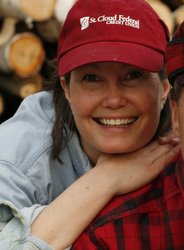I have always had a happy relationship with dirt. As a kid, I took pride in being perpetually filthy, and felt a strong kinship with the Peanuts character Pig Pen. Once I became a farmer, I discovered that dirt – or using grown-up farmers’ terminology, soil – is so much more than just the fun stuff that makes kids dirty. Soil is absolutely an essential ingredient in the food system, and it’s something that most of us just don’t spend a lot of time thinking about.
Soil is complicated. The more I learn about soil, I realize that I have barely touched the surface about what I really need to know. For this reason, at the recent Midwest Organic Sustainable Education Services (MOSES) conference in La Crosse, Wisconsin, I opted to concentrate my efforts on learning as much as I could about soil. The workshop speakers were all experienced organic farmers and each of them provided exceptional insights about the practices that they have done to keep their soils vibrant and healthy. What I was disappointed to learn was that there is no simple, magic recipe that a novice farmer like me can just employ and POOF! I would have perfect soil. On the contrary. Each field of soil is unique and needs very specific management practices to build it up and keep it healthy.
Even though I didn’t find the “easy soil” button at the conference, I learned a lot about what I could do. Most importantly, I gained a solid understanding of some of the basics about healthy soil. Here are a few of them.
Soil is alive!
A single handful of soil contains over six billion organisms -- that’s equal to the entire world human population. Multiply that times several tons of soil per acre, and the number is astounding. Using that calculation, on my farm, I figure I have a soil organism population somewhere between a gigajillion to a humongozillion.
Feed the soil, and the soil feeds the plants
The soil is like livestock. All of those delightful bacteria, bugs, and worms are hungry and need to be fed. When you feed the little beasties that live in the soil, they repay you by feeding the plants that you entrust to their care.
Organic matter matters
Soil is composed of 45% minerals, 25% water, 25% air, and 5% organic matter. The only area that we can directly impact is the 5% of organic matter. While 5% may not seem like much, it is vitally important to healthy soil. Feeding the soil a proper diet of natural foods such as manure, compost, and plant materials provides the nutrients all of the soil organisms need to thrive.
Sunscreen is needed
Soil is the earth’s skin, and it doesn’t like sunburn any more than we humans do. We may like to look at plants that have been neatly weeded with black dirt exposed all around them. But the truth is, that exposed dirt is not very happy. For this reason, the practice of growing cover crops helps build soil. Cover crops are complementary plants that grow alongside crops to keeps the soil covered, reduce weeds, add organic matter, protect the soil from the sun, and add nutrients to the soil at a critical point in time.
We’re losing it
Our topsoil continues to erode. At the MOSES conference, this statistic got my attention: for every 56 bushels of corn that leaves Iowa, 44 pounds of topsoil leaves too -- and ends up in the Gulf of Mexico. This means that soil that’s valuable here in the Midwest is polluting the waters of the Gulf of Mexico, creating a huge dead zone of low oxygen levels where life cannot be supported. This issue was further brought to light in the documentary Troubled Waters: A Mississippi River Story, produced by the University of Minnesota Bell Museum (I watched the film at the conference).
Maybe you don’t have a farm, a garden, or even a lawn, so soil is not something you think about all the time. That is totally understandable. The truth is, each of us has an impact on our soil every day, by the mere fact that we walk, run, bike, drive, and move across the ground. To better understand what we can do to better manage our ever-eroding soil, I highly recommend the movie Dirt! It’s a fun, entertaining, and educational look at dirt and how important it is. I guarantee the film will make you smile.
Even though I have always been fond of dirt, I have further transformed my thinking about its importance in my life. I don’t get upset when it gets tracked in the house and ground into the carpet. Instead, I look at dirt as a living, breathing life form that deserves my utmost respect. When I treat it well, and feed it well, my dirt will respond in kind, feeding me well in return.

Debbie Morrison is a frequent contributor to Simple, Good and Tasty. She and her husband Jim own and operate Sapsucker Farms, where their certified organic crops include maple syrup, honey, apples, plums and vegetables. Debbie's last post for Simple, Good and Tasty was How I Became a Minnesota Pineapple Farmer. Follow Debbie on Twitter at @sapsuckerfarms




